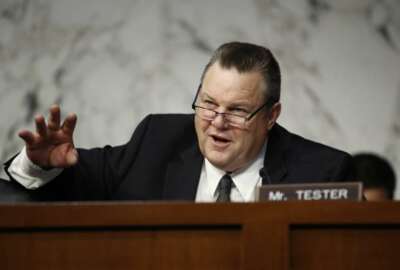
Federal employees can still be fired for accidentally eating marijuana edibles
In today's Federal Newscast, a federal court rules against an employee appealing his removal when he failed a drug test, after he says he accidentally ate a pot...
To listen to the Federal Newscast on your phone or mobile device, subscribe on PodcastOne or Apple Podcasts. The best listening experience on desktop can be found using Chrome, Firefox or Safari.
- The U.S. Court of Appeals for the Federal Circuit supported an agency’s decision to fire an employee for failing a drug test, even though he said he didn’t know he had consumed a pot brownie. The court ruled on an appeal from an employee at Customs and Border Protection in late December. Jeffrey Hansen said he accidentally used marijuana and was surprised by his supervisor’s call to take a random drug test. The court’s decision set the precedent. (U.S Court of Appeals for the Federal Circuit)
- A new law requires agencies to appoint chief data officers and chief evaluation officers, but a leading official from the Department of Homeland Security said agencies need to build a bigger “data entourage.” Donna Roy, executive director of DHS’s Information Sharing and Services Office said chief data officers need four or five other support staff to help them carry out their mission. President Donald Trump signed the Foundations for Evidence-Based Policymaking (FEBP) Act last month, which requires agencies to make the new hires. (Federal News Network)
- The Federal Communications Commission is dedicating more people and resources to getting rid of fraud in its $8 billion Universal Services Fund program. The FCC launched a fraud division within its Enforcement Bureau to formalize ongoing work. GAO found fraud was a major problem for the Lifeline program under USF back in 2017 with an improper payment rate of more than 21 percent. The commission still needs approval from OMB and the Hill before it can officially establish the new division. (Federal Communications Commission)
- Agencies are buying more through government credit cards than ever before. Departments charged a record $30.6 billion worth of goods and services last year. That is $2 billion more than in 2017. The General Services Administration reported the government charge card is more popular than ever with agencies completing almost 96 million transactions in 2018. That is up by more than $2.5 million transactions over last year. The Department of Veterans Affairs spent the most on government charge cards accounting for $11 billion. Agencies also received $310 million in refunds from their purchases. (General Services Administration)
- Top Republican lawmakers asked GSA inspector general Carol Ochoa to turn over documents to support claims she made in a Trump Hotel-related report earlier this month. Rep. Jim Jordan (R-Ohio) and Sen. Ron Johnson (R-Wis.) want to know if GSA ignored concerns about the emoluments clause by letting the Trump keep a lease on the Old Post Office. The lawmakers also questioned why Ochoa didn’t include legal arguments made by the Justice Department on the issue. (House Oversight and Reform Committee Minority)
- House Oversight and Reform Committee Chairman Elijah Cummings (D-Md.) raised concerns about recent personnel shuffling at the Education Department’s inspector general office. Cummings said acting IG Sandra Bruce had been told to leave and Education’s deputy general counsel Phil Rosenfelt would take her place. Cummings said Bruce hasn’t heard from the department at all since her removal, but the White House said she’s been reinstated. Cummings said he has serious concerns if the department appointed a deputy general counsel to oversee and investigate his own work. (House Oversight and Reform Committee)
- Though there wasn’t any mention of another potential government shutdown in President Trump’s State of the Union speech, one DC area congressman was looking to send a message about it. Rep. Don Beyer (D-Va.) welcomed Everett Kelley, national secretary-treasurer for the American Federation of Government Employees, as his guest at the event. Beyer said his aim was to draw attention to the thousands of federal workers who are anxiously waiting to find out whether large segments of the federal government will shut down again. (Rep. Don Beyer)
- A joint team of experts at the Defense Department and VA are examining the inter-agency program office set to manage electronic health record implementation. Acting VA Deputy Secretary Jim Byrne said that team should recommend a new governance structure for both departments by the end of this month. The question of who’s in charge has been a consistent question from lawmakers. VA and Armed Services Committee Ranking Members Reps. Jon Tester (D-Mont.) and Jack Reed (D-R.I.) wrote to VA Secretary Robert Wilkie recently, asking for more clarity about the departments’ joint decision-making structure. (Senate Veterans Affairs Committee)
- The Government Accountability Office said the Pentagon seems to be paying more attention to its recommendations, but still not as much as civilian agencies do. At the request of Congress, GAO looked at how often the recommendations it makes to DoD wind up being implemented. As of November 2017, the rate was just 53 percent. But GAO said it improved to 67 percent by November 2018. That score lags behind the government wide-rate for the year: 77 percent. GAO said DoD officials concurred or partially-concurred with more than 90 percent of the recommendations it made between 2014 and 2017, but didn’t always follow through. (Government Accountability Office)
- One federal agency closed its office in a major foreign country, distributing the work all over. U.S. Citizenship and Immigration Services fingers what it calls a significant decrease in its workload for closing its field office in Moscow. The doors will shut at the close of business on Feb. 28. After that, USCIS said its Athens, Greece office or the U.S. embassy in Moscow will have jurisdiction over immigration matters originating in Russia and 14 other nations. Forms will head to offices throughout the United States. (U.S. Citizenship and Immigration Services)
Copyright © 2024 Federal News Network. All rights reserved. This website is not intended for users located within the European Economic Area.
Eric White
Eric White is news anchor and Federal Drive producer at Federal News Network.
Follow @FEDERALNEWSCAST
Related Stories

Senators still seeking answers on joint DoD, VA leadership structure to manage EHR overhaul
Related Topics
All News
American Federation of Government Employees
Carol Ochoa
Citizenship and Immigration Services
Court of Appeals for the Federal Circuit
Customs and Border Protection
Data mining
Defense Department
Department of Homeland Security
Department of Veterans Affairs
Don Beyer
Donna Roy
electronic health records
Elijah Cummings
FEBP Act
Federal Communications Commission
Federal Drive
Federal Newscast
General Services Administration
Government Accountability Office
Jack Reed
Jeffrey Hansen
Jim Jordan
Jon Tester
Justice Department
marijuana
Office of Management and Budget
Phil Rosenfelt
Robert Wilkie
Ron Johnson
Sandra Bruce
Trump administration
Trump Hotel
Universal Services Fund




